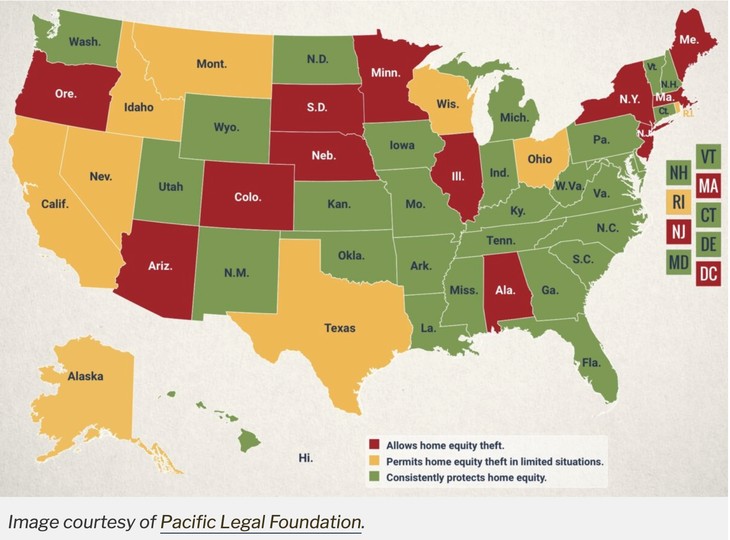Libertarians like to repeat the mantra that “taxation is theft.” In my mind, this is a bit of hyperbole, although it does serve the purpose of reminding people that government achieves its goals through coercion.
Generally, though, I avoid using the phrase because I think it doesn’t serves the purpose of persuading people to address solvable problems, such as excessive government taxing, spending, and regulation. Most people recognize that taxation is a necessary evil, the alternative bing roving bands of thugs stealing from you rather than more pleasant bureaucrats. Plus, you occasionally get a road out of the bargain.
Yet there are times when the rapaciousness of government officials is so obvious and so unrelated to anything remotely public-spirited that it is impossible to justify or pretty up. We see that often in civil forfeiture, and we see it in this case brought by the Pacific Legal Foundation that the Supreme Court just agreed to hear.
My latest at @lawcrimenews…stunning case but it's sadly far from rare:
The Government Seized an Elderly Minnesota Woman’s Home Over $2,300 in Unpaid Property Taxes, Sold It, and Pocketed the Proceeds. The Supreme Court Just Agreed to Hear Her Case.https://t.co/xceFmehW5W
— Sarah Rumpf (@rumpfshaker) January 14, 2023
The case has its origins in Hennepin County, Minnesota, and more particularly my city Minneapolis. Because of course it does. Both are quite rapacious governments, filled with bureaucrats who mouth comforting words of compassion as they shake you down and bully you incessantly.
In 1999, Geraldine Tyler bought a one-bedroom condo in Minneapolis, Minnesota that she called home until 2010, when rising crime in the neighborhood alarmed her and her family, so she rented an apartment in a safer area. After she moved, she had financial difficulties and about $2,300 in unpaid property taxes accrued on the condo.
In 2015, the total tax debt, penalties, interest, and fees Tyler owed to Hennepin County, Minnesota was $15,000. The county government seized her condo and sold it for $40,000.
But the county didn’t just keep the $15,000 she owed them; it pocketed the entire $40,000 proceeds from the sale.
First of all, it should be criminal that $2,300 in unpaid property taxes can transmogrify into $15,000 owed to the government. What are they, the mob?
Why yes. Yes they are exactly like the mob.
Second, why does it take longer to fill a pothole in the city than to seize a person’s property. The timeline isn’t totally transparent, but accumulating a tax debt of $2,300 over 4 years, while unfortunate, shouldn’t exactly get the government to mobilize the resources necessary to seize somebody’s abode, even if she isn’t living there at the time.
That’s more of a “put a note in the credit rating report” crime than steal somebody’s condo kind of crime. There are criminal cases that take almost as long to come to trial as this seizure did.
But the coup de gras–the totally unforgivable part of this–was that they seized the entire worth of the property, not just what they were owed. Rather than just putting a lien on the property to ensure they recovered their taxes and penalties, they took the property, sold it, and then pocketed everything.
Okey dokey.
This is, apparently, entirely legal in my state. I certainly didn’t know, although it confirms my belief that government is often a thinly veiled protection racket.
According to the PLF, Minnesota allows county governments to seize property for unpaid taxes, force a sale, and keep any excess value. From 2014 to 2021, at least 1,360 Minnesotans lost their homes in this way for debts that averaged only 8 percent of the home’s value, representing a stunning total of over $100 million in home equity lost.
This constitutes “home equity theft,” argues PLF, when the government takes more than what is necessary to satisfy the tax debt, and is a violation of the Constitution’s Fifth Amendment prohibition on taking property without just compensation and the Eighth Amendment prohibition on excessive fines and fees.
And Minnesota is far from the only state that permits home equity theft. A PLF review of laws across the country found it is allowed in a total of twelve states plus the District of Columbia and permitted “in limited situations” in an additional nine states.

You will own nothing and be happy, they said. And they mean it! The government owns your home, and merely allows you to rent it from them at the property tax rate they choose to charge.
PLF has continued to gather national data on home equity theft, finding thousands of homes that were forced into sales from 2014 to 2021 by local governments or private investors holding tax certificates (that’s an entirely different avenue for abuse) and losing over $777 million in home equity. But these figures “severely understate” the problem because they’ve only been able to review select records in a fraction of jurisdictions in each state. “The reality,” says the PLF website, is unquestionably “even worse.”
As an example of how some states have drafted protections for property owners, Section 197.582 of the Florida Statutes provides clear procedures for the disbursement of proceeds from a tax sale, spelling out the priority of payments to the holder of the tax lien, any other government liens, and senior and junior lien holders (such as mortgages, second mortgages, or home equity loans). Florida law directs the clerk of the court collect the surplus funds, provide notice to lien holders to submit their claims within a 120-day claim period, and then if there are any remaining funds after that time expires, “there is a conclusive presumption that the [former property owner] is entitled to the surplus funds.”
Government always looks better the less you examine it. Liberals view government power through beer goggles–with that hazy and indistinct gaze that singles get at the end of a long night drinking at the bar. Drunk and filled with a lust (for power, in this case) so powerful that otherwise obvious flaws blur, it is only when the bright light of morning filters in through the window that they might notice their companion has warts all over.
Loving government is like going to bed with a 10 and waking up with a 2.
If there is any justice in the world the Supreme Court will stop this banditry once and for all. The distinction between taxation and outright theft is that there are some rules associated with taxation, and at least the gloss that we collectively agreed to those rules by a somewhat legitimate process.
That’s not an airtight argument, but we accept the imperfection because all the alternatives appear to be worse.
Once government outs itself as little but a protection racket, though, it’s hard to maintain the fiction that its actions are legitimate.
These days it often seems as if the people in power kind of like it that way. “Sure, it’s unfair. What are you going to do about it?”









Join the conversation as a VIP Member